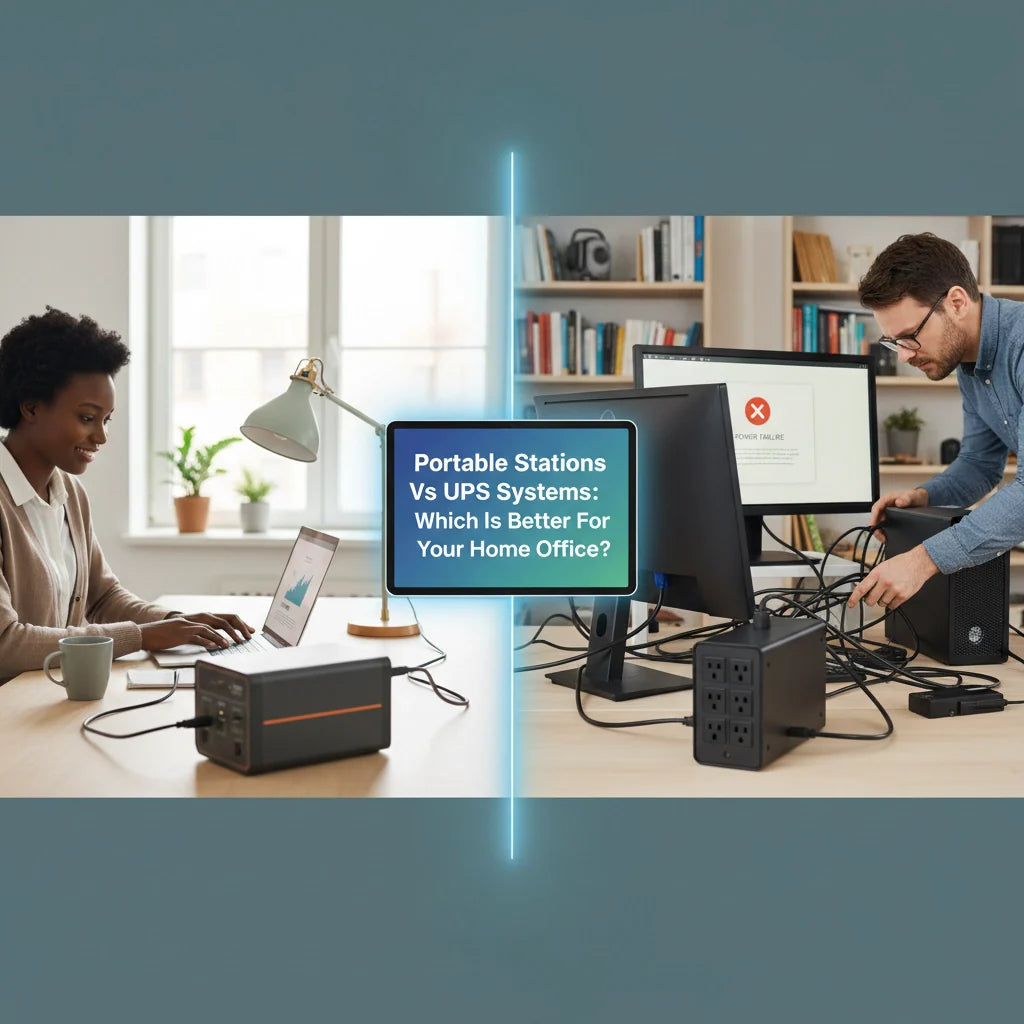
Portable Power Stations Vs UPS Systems: Which Is Better For Your Home Office?
Share
When your home office loses power in the middle of an important video call or while you're finishing up a crucial project, you'll quickly realize the value of backup power. But should you invest in a traditional UPS (Uninterruptible Power Supply) system or go with one of those trendy portable power stations? The answer depends on what you're trying to protect and how you work.
For most home office setups, UPS systems win when you need instant protection for sensitive equipment, while portable power stations excel when you want extended runtime and flexibility. Let's break down exactly what each option brings to the table.
Understanding UPS Systems for Your Home Office
UPS systems are the tried-and-true solution for office power protection. These units sit between your equipment and the wall outlet, constantly monitoring power quality and instantly switching to battery power when problems arise.
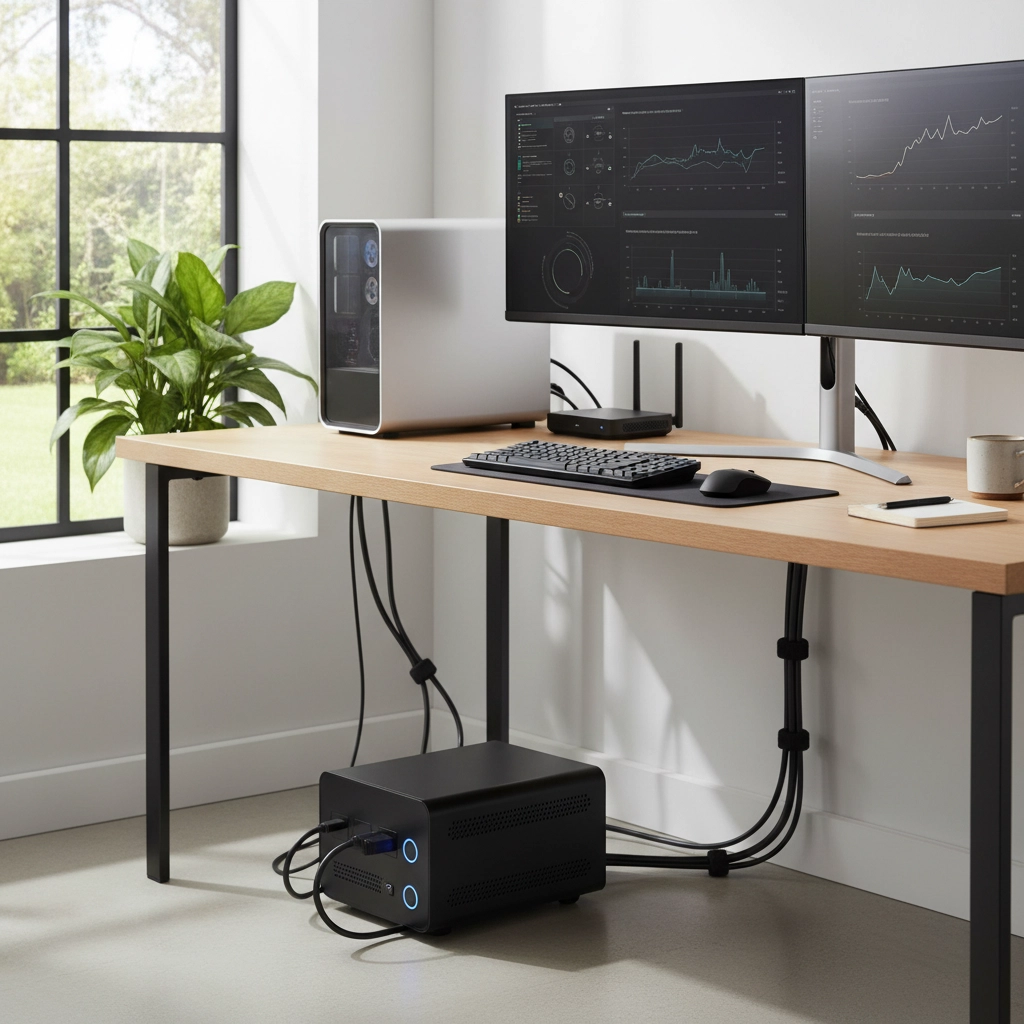
What Makes UPS Systems Special:
- Lightning-fast response: Switchover happens in less than 10 milliseconds – so fast your computer doesn't even notice
- Always monitoring: They're constantly filtering power quality, protecting against surges, sags, and spikes
- Designed for critical gear: Built specifically to keep computers, servers, and network equipment running safely
The Good Stuff: UPS systems excel at what they're designed to do. When the power goes out, your desktop computer gets those precious few minutes needed to save work and shut down properly. No more losing hours of work to surprise blackouts. They're also relatively affordable – you can get solid protection for your home office starting around $100-200.
The automatic operation is clutch too. You don't need to think about it or manually switch anything. Power goes out, UPS kicks in, and you've got time to wrap up what you're doing.
The Limitations: Here's where UPS systems show their age: runtime. Most units designed for home offices provide maybe 15-30 minutes of backup power. That's enough for a safe shutdown, but forget about finishing that presentation during a longer outage.
They're also pretty much one-trick ponies. A UPS plugs into the wall, your stuff plugs into it, and that's where it stays. Need backup power in another room? You're out of luck.
Portable Power Stations: The New Kid on the Block
Portable power stations are basically giant battery packs with multiple types of outlets. Think of them as the Swiss Army knife of backup power – they can handle way more than just computer equipment.
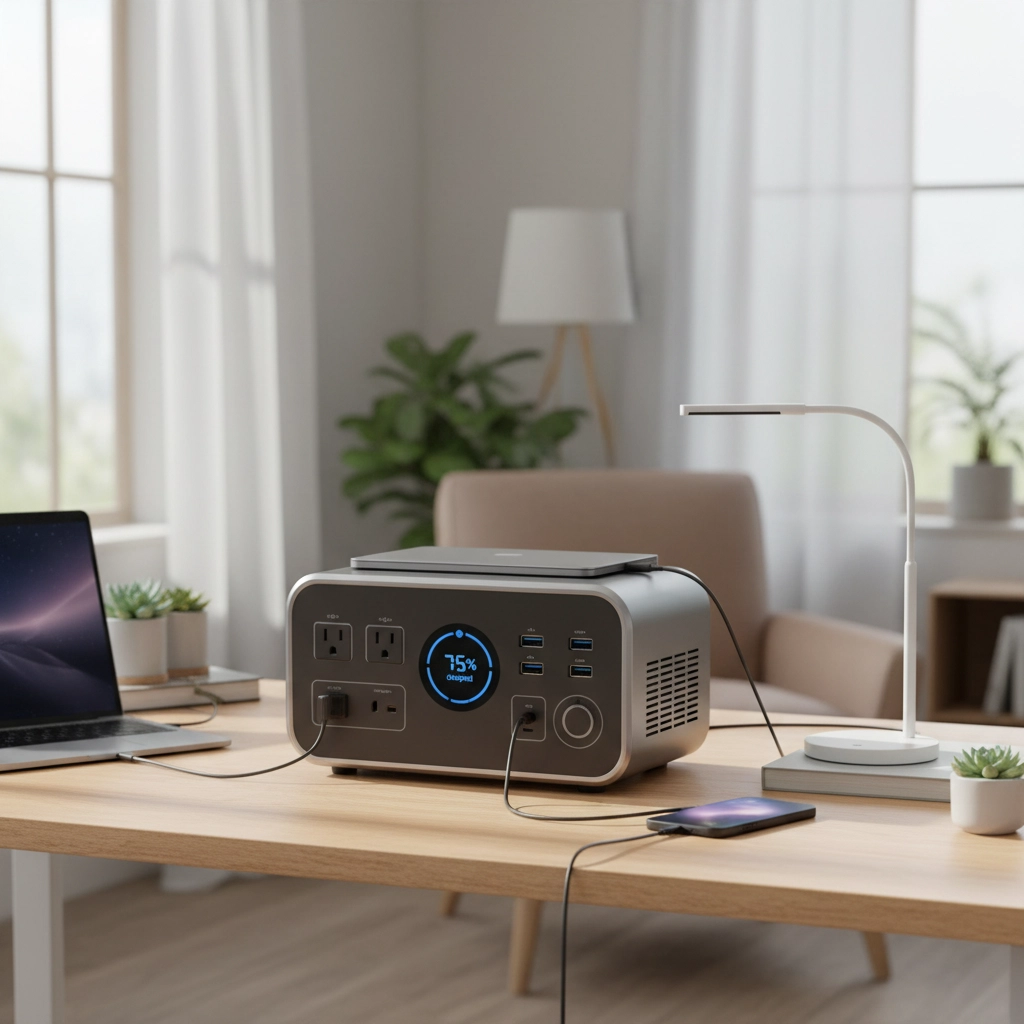
What Sets Them Apart:
- Massive battery capacity: We're talking 300-2000+ watt-hours compared to a UPS's typical 100-150Wh
- Multiple charging options: Wall power, solar panels, even your car
- Variety of outlets: AC plugs, USB ports, 12V car outlets – basically everything
The Good Stuff: Where portable power stations really shine is runtime. A decent 1000Wh unit can keep your laptop, monitor, and router running for hours. Some can power your entire home office setup for a full workday during an extended outage.
The portability factor is huge too. Use it in your office today, take it camping this weekend, or move it to another room where you need power. Many models also support solar charging, which means you could theoretically keep working indefinitely during long outages.
The Trade-offs: Here's the catch – most portable power stations don't provide that instant switchover that UPS systems are famous for. When the power goes out, you'll need to manually plug your stuff into the power station. Your computer might shut down before you can make the switch.
They're also significantly more expensive. A power station with enough capacity for meaningful home office backup typically starts around $500 and can easily hit $1500-2000 for higher-capacity units.
Head-to-Head Comparison
| Feature | UPS System | Portable Power Station |
|---|---|---|
| Switchover Speed | Instant (<10ms) | Manual connection required |
| Battery Capacity | 100-150Wh typical | 300-2000Wh+ |
| Runtime | 15-30 minutes | Hours to days |
| Price Range | $100-400 | $500-2000+ |
| Portability | Stationary | Highly portable |
| Outlet Types | AC only | AC, USB, 12V, sometimes wireless |
| Charging Options | Wall power only | Wall, solar, car charging |
| Best For | Critical equipment protection | Extended outage scenarios |
Which One Should You Choose?
Go with a UPS if you:
- Work primarily on a desktop computer with important data
- Need protection for network equipment (router, modem, NAS drive)
- Experience frequent brief power issues rather than long outages
- Want set-it-and-forget-it protection
- Have a limited budget
Brands like APC by Schneider Electric and CyberPower offer excellent home office UPS options. The APC Back-UPS series and CyberPower's CP series are particularly popular for their reliability and value.
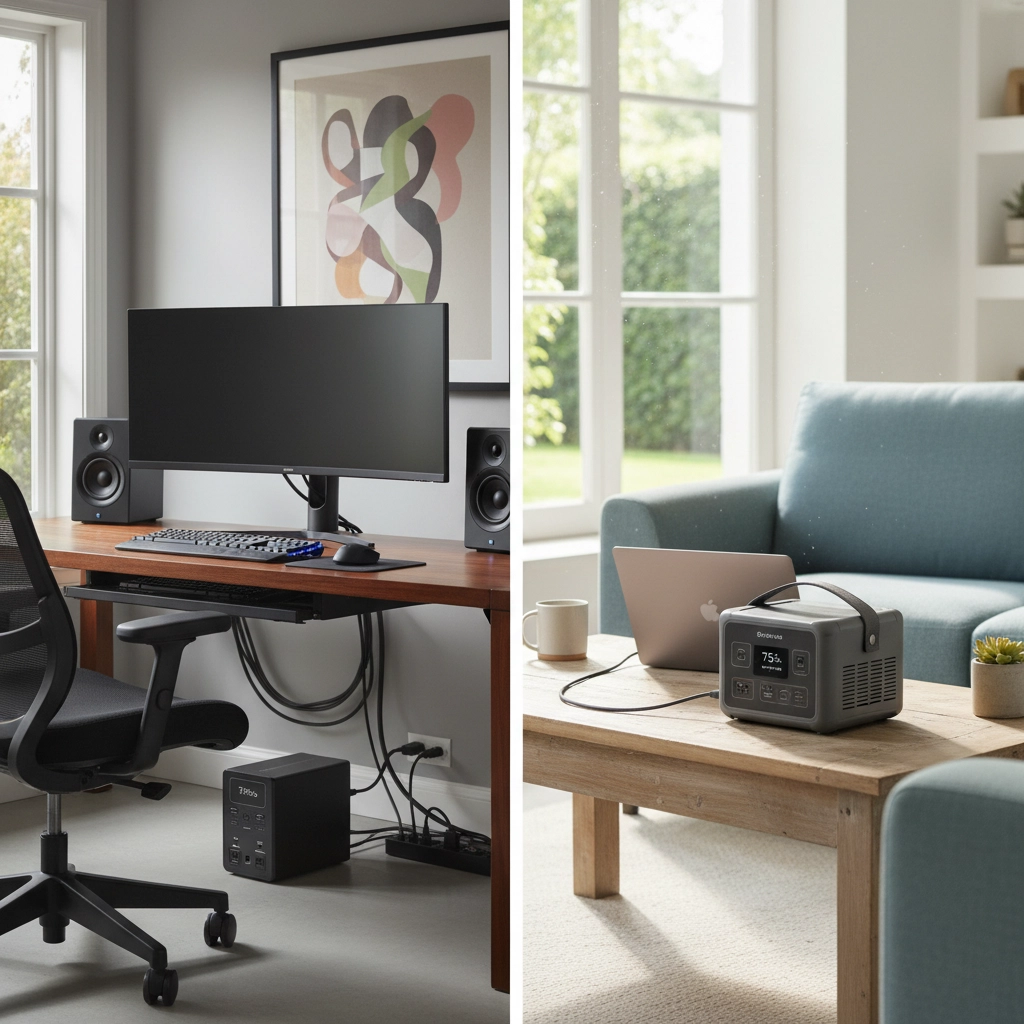
Choose a portable power station if you:
- Use primarily laptops and can handle brief power interruptions
- Experience extended outages lasting several hours
- Want backup power throughout your home
- Value the ability to charge via solar panels
- Need to power multiple devices with different plug types
The Hybrid Approach
Here's what many smart home office workers are doing: using both. A small UPS protects critical equipment like your desktop computer and router, while a portable power station handles extended outages and powers additional devices.
This gives you the best of both worlds – instant protection for sensitive gear and extended runtime when you need to keep working through longer blackouts.
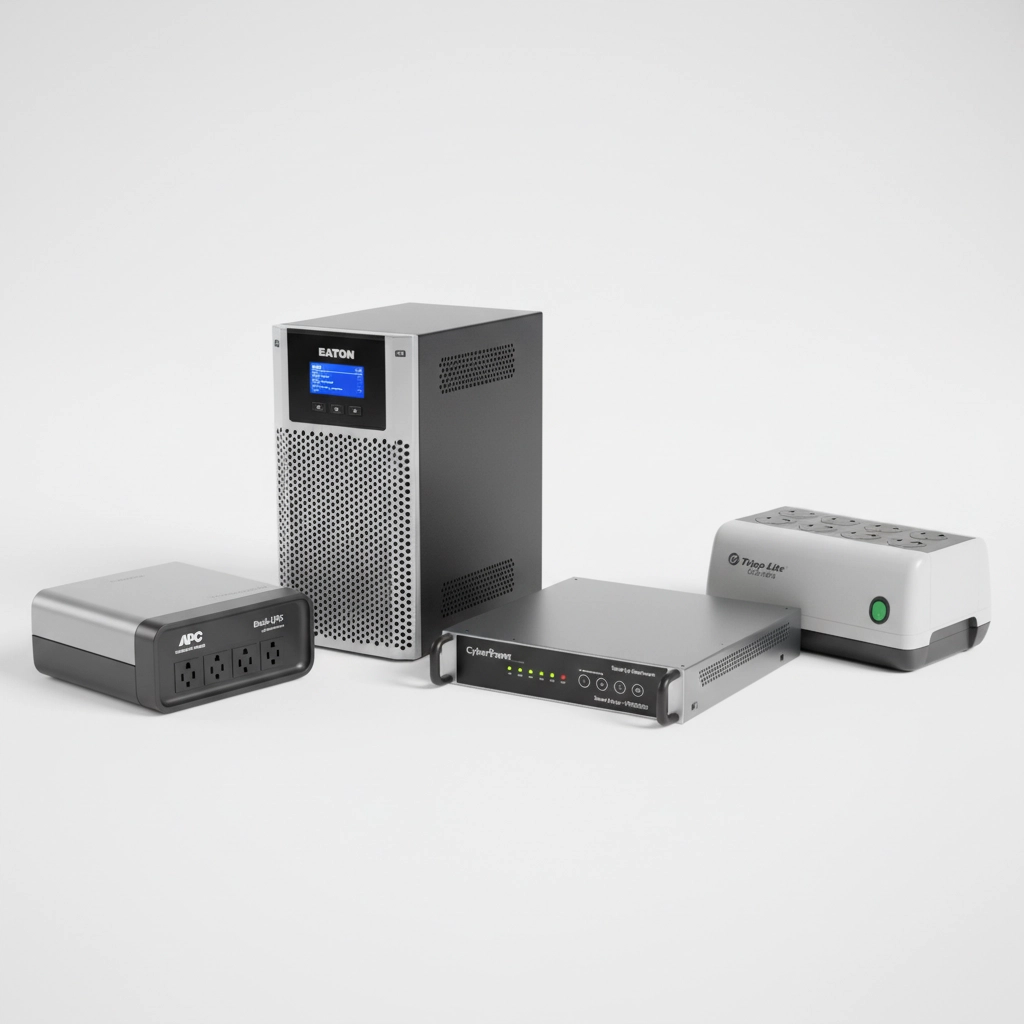
Brand Recommendations for Different Needs
For Traditional UPS Protection:
- APC by Schneider Electric: The gold standard for reliability, with excellent software for monitoring and automatic shutdowns
- CyberPower: Great value option with similar features to APC at lower prices
- Minuteman: Solid mid-range option with good customer support
- Vertiv (formerly Emerson): Premium option for more demanding setups
Power Calculation Made Simple: Before buying either solution, add up the wattage of everything you need to keep running. Your computer might use 200-400W, monitor another 50-150W, router 15-30W. A 600W UPS or 800Wh power station would handle this setup comfortably.
Making the Right Call
The truth is, there's no universal "better" choice – it depends entirely on your specific situation. If you're protecting a traditional desktop-based home office and experience typical brief power issues, a quality UPS system will serve you well and cost significantly less.
But if you work on laptops, experience longer outages, or want the flexibility to power other devices and rooms, a portable power station makes more sense despite the higher upfront cost.

Ready to protect your home office from power problems? Contact our team at Ace Real Time Solutions to discuss which power protection solution fits your specific needs. We'll help you calculate your power requirements and recommend the right equipment to keep your business running smoothly, no matter what the power grid throws at you.
Don't let the next power outage cost you hours of work or important data. The investment in proper backup power pays for itself the first time it saves your bacon during an unexpected blackout.
